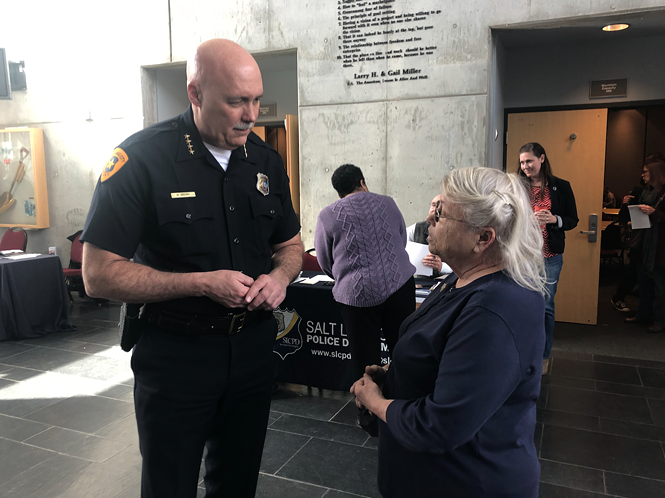Buzz Blog
Unaccounted for
Law enforcement officials gather in Sandy to help Utahns find missing loved ones.

- Kelan Lyons
- Linda Fields and Police Chief Mike Brown talk at the inaugural Missing in Utah open house.
Linda Fields spent her Saturday driving two-and-a-half hours from her home in Annabella to Sandy, to ask state and local law enforcement officers for help finding her husband, James.
“What else am I gonna do?” she said in the lobby of the Miller Conference Center. “Sit at my home and cry? I’m trying to avoid that.”
James went missing less than a week ago. Linda had been in San Diego on vacation when she found out he never showed up to a doctor’s appointment. She cut her trip short and flew back home so she could start looking for him. “I talked to him in the morning and I knew he was confused because he didn’t know where I was,” Linda said, explaining that her husband has medical issues that could be contributing to his disorientation. Staying strong through the power of prayer, she’s asking everyone to be on the lookout for her husband’s 2012 Dodge Ram. “When the truck is found, he will be found,” she said. “He doesn’t walk real well, you know, long distances, so he didn’t leave the truck and walk to the freeway.”
Linda told her local police that James is missing, but she wants as many people as possible searching for her beloved husband of 33 years. That yearning brought her to the “Missing in Utah” open house, where state investigators and police from across the Salt Lake Valley updated her case. “I’m just thankful for all of this help,” Linda said shortly before starting her trek back to Sevier County. “This was a good thing to come up.”
The goal of the inaugural event was to give people a chance to tell law enforcement officers about their missing loved ones. “People a lot of time don’t file missing persons reports,” Salt Lake City Detective Michael Ruff told City Weekly before the open house. Ruff said there are a multitude of things that make it difficult for Utahns to log that information with law enforcement—jurisdictional issues, confusion surrounding whether you have to be a family member to report someone missing (you don’t) and an elusive myth that you must wait 24 hours before filing the paperwork. “I think there’s a lot of procedural things that keep people from reporting people missing,” he theorized.
Investigators cross-referenced the newly filed or updated reports in their databases to see if any new information popped up. “It’s very much the beginning of the process,” Salt Lake City Detective Greg Wilking said of the report-filing. “Hopefully, the idea is that every single one of these missing persons that gets reported, we’re able to solve it,” he said. “That’s not realistic, but hey, it’d be great if everybody had that closure.”
The function presented an opportunity for an array of institutions to work together. Health department representatives, for instance, were on hand to look up vital statistics, which helped investigators figure out their inquests’ next steps. “If we discover a death certificate for someone who’s missing, then obviously that case is a very different case to handle than a missing person who has no record anywhere after a certain point,” SLCPD Public Relations Director, Christina Judd, said. “When we coordinate with nonprofit agencies, governmental agencies, and nongovernmental agencies, then we feel like we have enough people involved that we’re going to have the best outcome.”
Absent from Saturday’s gathering were representatives from the Peaceful Advocates for Native Dialogue and Organizing Support’s Murdered and Missing Indigenous Women of Utah committee. Reached by phone, Jennifer Boyce, committee chair, said her group was busy planning another event, but they shared the Missing in Utah flyer with their email lists and on their campaign sites. Stressing that she’s speaking for herself and not PANDOS as a whole, Boyce said the open house could help Native Americans find their missing loved ones, but she thinks some could be hesitant to give police a DNA sample, out of fear law enforcement officers will somehow use it against them. “That may or may not be a dealbreaker for some people in general, and that includes Natives and other people of color,” she said. “That comes back to that foundation of trust and relationships built.”
Judd said Missing in Utah participants were free to provide officers with whatever information they were comfortable with. “We just want to be as accessible and as helpful as possible,” she explained. That said, the more comprehensive a case file is, the better. “The more information we have, the more likely that we’ll be able to follow up on these cases,” she said.
Another potential shortfall, Boyce added, is that indicating race on a missing person report is optional, and even when race is identified, respondents can’t write in a tribe’s name. Judd said there are usually “free text cells” in systems that allow detectives to punch in that information, but each jurisdiction is different. “That’s probably why we have a disconnect, but that’s also why we talk to other jurisdictions and we have those conversations,” Judd said. “It’s helpful for us to make sure we’re that covering all our bases in that way.”